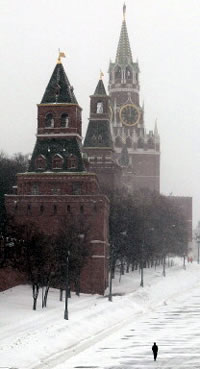The European Union should not let Russia off the hook on democratic standards just in order to do more trade, the foreign minister of Estonia, one of the bloc's new Baltic former Soviet republics, said on Friday.
"Tighter economic relations between the EU and Russia are useful and beneficial to both," Kristiina Ojuland said.
"However, the EU's common values and democratic standards should not be sacrificed for economic gains," she said.]
The membership earlier this year of the three Baltic former Soviet republics of Estonia, Latvia and Lithuania to the EU and NATO threw the spotlight on the tense relations between Moscow and its former satellites.
Moscow regularly charges both Latvia and Estonia, until 13 years ago republics of the Soviet Union, which have large ethnic Russian, Russian-speaking minorities, with repressing these minorities' rights.
Estonia and Latvia respond that their top priority is consolidating their re-acquired statehood, sometimes through cultural and linguistic steps at odds with Russia.
Lithuania, which gave everyone citizenship upon independence, does not have the same problem.
Addressing a conference in Tallinn on the EU's policy towards its neighbours, Ojuland said the EU "should maintain its efforts to thoroughly convince Russia that the continuation of its democratic and market economy reforms is necessary for successful economic cooperation with the EU."
Diplomats said Russia was keen to discuss trade with the EU but not human rights and democratic standards.
An EU-Russia summit, now due to take place next week, was postponed earlier in the month by Russia as Moscow cited the need to have the new EU executive, the European Commission, in place.
But Commission spokeswoman Emma Udwin said at the time that the postponement also to do with disagreements between the EU and Russia over an agreement which forms the framework for future bilateral relations between the EU and Russia.




 By: N. Peter Kramer
By: N. Peter Kramer
